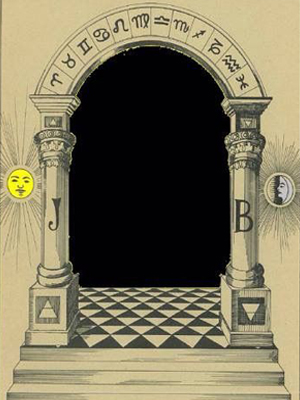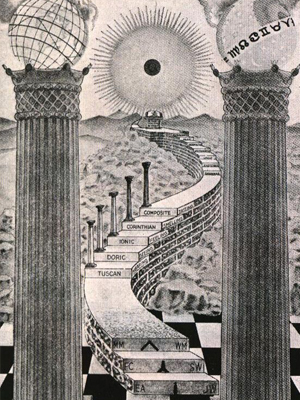Masonic Articles and Essays
Our Trust Is In God
Bro... Carl Claudy 33o
Date Published:
10/16/2024
Freemasonry has long maintained that its Work is done in the name and to the glory of the Great Architect of the Universe - God. What is the nature of our relationship with the Creator and why must Masons put all their faith in Him Who Rules on High?
 The Church and Masonry are two subjects with great similarity, but also striking differences. When one considers them together, there are certain basic truths that should be recognized. To review these truths is to recognize the true relationship between them. In Masonic terms and for this paper "God," "Deity," "Grand Architect," "Supreme Being," and other similar references to the Holy Father are varying ways to refer to the "One and Only,'' according to individual preferences, without infringing on the preference of his particular church. Similarly, all individual churches are, in Masonic terms, considered as the Church. George Bernard Shaw said, "There is only one religion, though there are a hundred versions of it." Yes, each denomination has its own belief in what the Church should be. Masonry takes no preference in this separation of thought about the Church, but accepts the universality and the individual member's preference.
The Church and Masonry are two subjects with great similarity, but also striking differences. When one considers them together, there are certain basic truths that should be recognized. To review these truths is to recognize the true relationship between them. In Masonic terms and for this paper "God," "Deity," "Grand Architect," "Supreme Being," and other similar references to the Holy Father are varying ways to refer to the "One and Only,'' according to individual preferences, without infringing on the preference of his particular church. Similarly, all individual churches are, in Masonic terms, considered as the Church. George Bernard Shaw said, "There is only one religion, though there are a hundred versions of it." Yes, each denomination has its own belief in what the Church should be. Masonry takes no preference in this separation of thought about the Church, but accepts the universality and the individual member's preference.
Two principal truths should be recognized about the Church and Masonry. First, Masonry does not replace the Church in worship of God and secondly, a spirit of cooperation and understanding is to be encouraged in both the Church and in the Masonic Temple. Since any misunderstanding is more likely to be on the part of church people looking at Masonry, rather than Masons looking at the Church, it becomes the responsibility of Masons to take positive and affirmative steps to ward off any misunderstanding.
To avoid misunderstanding, it is essential that no Masonic activities be scheduled at a time or place that would interfere with activities of the Church. Scheduling rehearsals, for ex-ample, or scheduling any program is restricted by the Codes of many Grand Lodges.
In Minnesota, for example, the Grand Lodge Constitution states: "No Lodge shall hold any communication upon the Sabbath or first day of the week, except to conduct the Masonic funeral services of a deceased Brother." In 1978, this was amended to permit an afternoon or early evening ceremony on the Sabbath for public installation of Lodge Officers. But the well-meaning intent of Masonry is to avoid Lodge activity that would in any way conflict with customary Church activity.
Masonry is not a religion, and does nothing to interpret or effect various persuasions or faiths of its members. Masonry teaches, and has preserved in ancient purity, the cardinal tenet of the old primitive faith, which underlies, and indeed is the foundation of religion, which is that God is One, and that every member must have a firm and abiding faith in that fact.
Masons are encouraged to be active members of a church. It is generally recognized, and many churches have discovered, that the outstanding leaders and officers of a church are often active Masons in their Lodges. Masonry and the Church do not compete as far as their basic teachings are concerned. They seek to strengthen and support each other.
Masonry insists that every member have a firm belief in God, but does not interpret what the God is like. This is the purpose of the Church, and is clearly the distinct and separate reason why Masonry and the Church can and do work together. They have different purposes.
Historically, during periods of the rise to power by dictators and other forms of government that demand individual minds to cease to think, and to turn allegiance to demands of the central government, Masonry has been among the first organizations to be persecuted. Churches more often have been allowed to function under controlled patterns of influence, using directed church leadership as the forum for new thinking .
Masonry is one of the most powerful influences and forces for maintaining in the citizens, principles of freedom of thought, freedom of conscience, the right to learn, the desire to follow truth, understanding, and what we symbolically call Light. This is what the Church does also, but in a different way. Both are working toward a common end.
Masonry in America, since the inception of the American Constitution, has supported the theme of a public educational system. Education existed since early ages of mankind, later was undertaken by the Church as one of the fundamental elements. Many schools and universities all over the United States were started as an outgrowth of religious men and women concerned about education of youth.
A member of any Masonic body can never be "saved," religiously speaking, by being in Masonry. Both Masonry and the Church, however, use the Bible as the source of Light, the source of inspiration. The Mason will be a better churchman, and have a strong faith by having received Light in Masonry and the Light of the Holy Bible, and will find in it the way for the soul's welfare and salvation. The Holy Bible has sometimes been referred to by such terms as "book of life," or "the operating manual for living," or "trestle board of life," because of its complete and all-encompassing nature of providing a solution to every problem. For example, when the missionary, John Eliot, completed a huge undertaking to translate the complete Bible into the Algonquin Indian language in the mid-seventeenth century, he is quoted as saying, "The word of life is now your own," as he gave the first copies of this first American Bible to his people. Therefore, the Light that is found upon the Altar in a Masonic Temple is the basis of our faith, and of our life. Spiritually, mentally and morally, a member finds source for strength in both the Church and in the Masonic Temple. But, because of his understanding, he never lets one take the place of the other. Knowing the respective places of each, one can be a better Mason because of being a faithful member of the Church, and likewise be a better member of the Church because of being a Mason.
 Masonry and the Church, like the pillars Jachin and Boaz, provide two very strong foundations on which one builds a life. From these foundations rise landmarks of humanity which have called upon the skill of writers throughout the ages, and incite meanings, construct allegories, invite continuing study, and incite the imagination into what one can become. Masonry is not a religion, but both Masonry and the Church invite men of all religions to war against wrong, uphold truth, and covet charity, or love. This universality of the Church is recognized by Masonry and, as noted earlier, Masonry takes no preference in individual denominations but accepts each member with whatever denominational relationship he may have. In so doing, every Mason is reminded of duty and obligation. His lips should be sealed against vulgarity and falsehood. His life will at-tract good men to follow the same road.
Masonry and the Church, like the pillars Jachin and Boaz, provide two very strong foundations on which one builds a life. From these foundations rise landmarks of humanity which have called upon the skill of writers throughout the ages, and incite meanings, construct allegories, invite continuing study, and incite the imagination into what one can become. Masonry is not a religion, but both Masonry and the Church invite men of all religions to war against wrong, uphold truth, and covet charity, or love. This universality of the Church is recognized by Masonry and, as noted earlier, Masonry takes no preference in individual denominations but accepts each member with whatever denominational relationship he may have. In so doing, every Mason is reminded of duty and obligation. His lips should be sealed against vulgarity and falsehood. His life will at-tract good men to follow the same road.
In the end, the good Mason will be that person who can look upon death, and see in its face the same countenance with which he hears its story. He will endure all the labors of his life with his soul supporting his body, and amply returning to the world the fruits of his gifts from God. His crowning glory then, will be that his Church will mourn his passing with the knowledge that one of their greatest supporters has passed the test of time. To reach this height, Masonry invites its members to be equally familiar with both the landmarks and instruction of Masonry, as well as with landmarks and instruction of the Holy Bible. Dr. Henry H. Halley, recipient of the Gutenberg Award and author of a noted "Bible Hand-book," noted the widespread neglect of the Bible ". We talk about the Bible, and defend the Bible, and praise the Bible, and exalt the Bible. Yes indeed! But many church members SELDOM EVER EVEN LOOK INTO A BIBLE, indeed would be ASHAMED to be seen READING the Bible." Masonry will share the burden of such neglect if it does not continue to share encouragement for reading and studying the Bible as well as Masonic literature.
In summation of these thoughts concerning a Masonic relationship with the Church, the words of an unknown poet are most appropriate:
THE LODGE ON HIGH
When you've passed on to that Far Land
Beyond the skies and take your stand
Before Jehovah's Great White Throne,
Clad only in a gown - alone
A pilgrim tired, without one cent
To show for all the time you've spent,
The work you've done down here below
In this old strife-torn vale of woe
My son, I'm sure the Lord won't care
If you were poor or millionaire.
And when we've ceased our daily grind,
Left all our worldly goods behind
And landed safe above the clouds,
We'll look alike in snowy shrouds
With feathered wings and hand in hand
We'll both enroll in Heaven's Band.
And, son, I know that we won't need
To fuss about our race or creed
Or if we took some high degree
As Mason, Moose or K. of C.
If you've believed in one true God,
The straight and narrow path have trod,
No matter what your lodge may be,
Your politics or pedigree,
You'll need no word or paid-up card
To pass you by the outer guard.
There's just one Order I surmise
The Lord of Hosts will recognize,
The biggest Lodge since time began
And that's the Brotherhood of Man.
More Masonic Articles
Explore articles and essays written by Freemasons about Freemasonry.
Read More
Membership
Interested in becoming a member of the worlds oldest Fraternal organization?
Read More